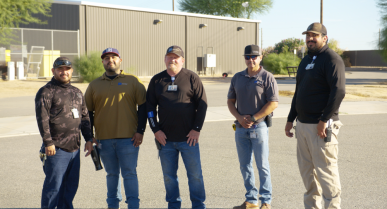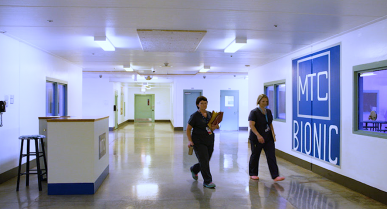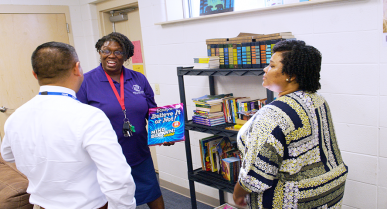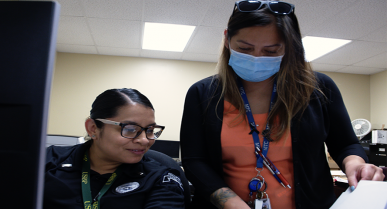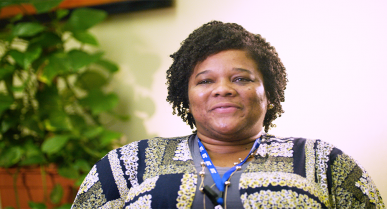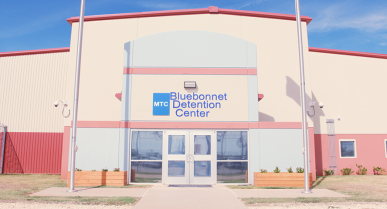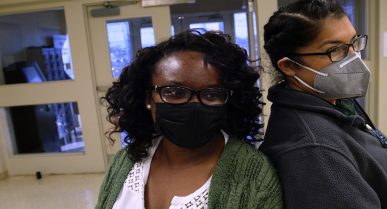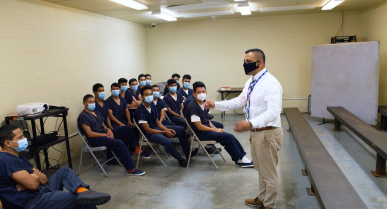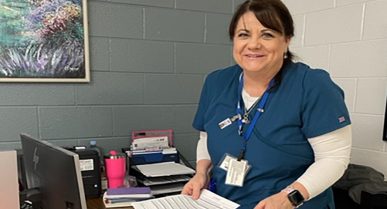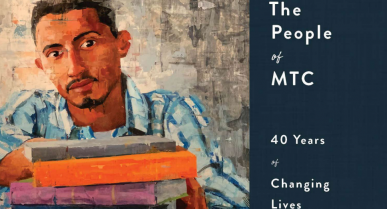We Take You Inside to Show You MTC’s Difference in Detention
With all the recent media coverage about immigration policy, we thought it was important to take a minute and tell you about MTC’s involvement with Immigration and Customs Enforcement or ICE and to show you MTC’s approach in detention. You can also read a statement about our involvement with ICE here.

MTC operates five detention centers for ICE. While none of them house any children or minors, we wanted to show you what life is like for adult detainees inside MTC-operated detention centers.
While detainees only spend a short time in our detention centers, eight weeks on average, we know we can make a difference in their lives by providing them with a safe, clean environment and by giving them access to quality healthcare, legal resources, nutritious meals, contact with loved ones, recreation, educational classes when possible, and other resources offered by community organizations.
MTC staff are trained to treat detainees with great respect and dignity. We call it a BIONIC…Believe It or Not I Care approach.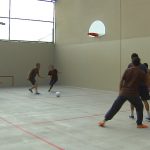
And what we do we do with great oversight from Immigration & Customs Enforcement, third-party organizations, community leaders, and social service groups that visit our detention centers on a regular basis.
Let’s take you inside and show you how we accomplish our mission.
 We begin in southern California. This is the Imperial Regional Detention Facility in Calexico. It houses approximately 700 detainees, most of whom are male.
We begin in southern California. This is the Imperial Regional Detention Facility in Calexico. It houses approximately 700 detainees, most of whom are male.
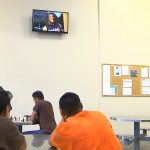 The housing areas have an open living space with bunk beds, shower and bathroom facilities, a day room with televisions, phones to contact loved ones, and an outside recreation area.
The housing areas have an open living space with bunk beds, shower and bathroom facilities, a day room with televisions, phones to contact loved ones, and an outside recreation area.
Detainees are served three meals daily.
In addition to smaller recreation areas, there’s a large recreation yard.
There’s a medical and dental facility. If there’s an urgent care issue, detainees are seen immediately, otherwise they’re typically seen within 24 hours.
The facility also has several courtrooms where judges handle asylum and other cases via video conferencing.
Detainees have access to legal resources in the law library to help them prepare their case.
The facility also has a unique partnership with a local victims’ rights organization called the Sure HelpLine Crisis Center.
Advocates visit the facility on a regular basis to help detainees deal with various challenges including depression and stress.
Margaret Souza who’s the executive director of Sure HelpLine Crisis Center visits the facility often.
“I love it. I love everything about it. I love the cleanliness. We go into the detention center, and it is peaceful. It is clean. They’re well fed. They’re well taken care of. I’ve met the medical doctor that’s on call for them.”
Margaret is a strong advocate for people’s rights and for her that begins right here in this detention center. She points out the warden is always willing to facilitate their visits.
“There are times when victims want to talk about to something, not something that happened here, but some trauma. So, he does give them privacy on a one-to-one basis with my lead advocates, and that’s very important. There really are no complaints whatsoever.”
The same goes for Carlos Flores who’s with the Mexican Consulate in Calexico.
“In my opinion, MTC is a very modern, it’s a very functional, and it’s a very clean place where they treat the inmates respectfully. And amongst them, a good number of Mexicans.”
Carlos has visited the detention center many times and even partnered with the facility to provide educational programs to detainees. Flores sees firsthand how MTC staff live the company’s moto BIONIC, Believe It Or Not I Care.
“I like that they treat them with respect, that they’re very thoughtful. You can sense there’s an atmosphere of camaraderie amongst the people who are here.”
The facility also strives to serve the unique needs of the small female population. This gender responsive approach goes a long way in helping these women feel safe and positive.
Margaret assures the public that detainees at the Imperial Regional Detention Facility are in good hands.
“There’s no reason for them to be scared. There’s no reason for them to be worried. This is an A-1 facility.”
The second facility we operate for ICE is in the state of New Mexico. Located in the small town of Chaparral, the Otero County Processing Center houses approximately 800 male detainees.
And just like the Imperial facility, MTC works hard to ensure the physical facilities are clean, well-kept and comfortable.
John Colquitt has lived in the area for decades and knows MTC and the company’s New Mexico facilities well.
“Whenever we’ve had tours through the facilities, I’ve always been very impressed with how orderly everything was; how clean everything is, the educational programs, the quality of the food, how nice the staff is, how well behaved the detainees are. It’s been a real eye opener to see how it is.”
The facility hosts various sporting tournaments and other activities to keep the men engaged.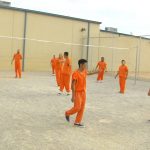
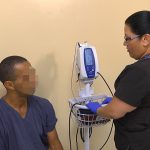 Just like the Imperial facility, detainees have access to medical and dental care.
Just like the Imperial facility, detainees have access to medical and dental care.
“I would say from everything I’ve seen, they’re being treated very, very well, with great respect.”
The Otero County Processing Center also recently began providing tablets to detainees. Five tablets are set up in each housing area. The men can use these devices to video chat with family, access limited websites, and watch movies.
And the third and final detention center MTC operates for ICE is just north of Houston, in Livingston, Texas.
The IAH Detention Center houses approximately 1,000 detainees.
The dorms in this center house a smaller number of individuals but with the same access to shower and bathroom areas, telephones, TV and other activities.
There are four smaller rec areas and one large recreation facility, a law library, and medical center.
“The people here, the staff, all of them; from the most senior to the newest staff, they treat others well.”
Argimiro Garcia is a volunteer chaplain. He’s says detainees that have been at other facilities tell him this is the best detention center they’ve experienced.
“They say it’s the best because it’s well-maintained, it’s clean. The needs that they have like medical; sports, they go outside for recreation, basketball. They say they’re real content. They don’t have anything they’re lacking.”
“I think from the moment I walk through those gates, everyone was smiling, very friendly, from the detainees to the employees. :06
Crystal Finegan is the executive director of a child advocacy group called Childrenz Haven. She visits the detention center monthly and is impressed with what she sees.
“Just this morning I came in there’s a few detainees who are working out in the yard and everyone had stopped to smile and wave. So, everyone is really friendly. They seem happy.”

MTC’s fourth detention center is in Southern Texas. The El Valle Detention serves approximately 1,000 people. The fifth center is also in Texas near Abilene in the central part of the state. The Bluebonnet Detention Center, as it’s called, also serves approximately 1,000 men and women.
We are committed to the providing the best services possible at the detention facilities we operate. For the past 12 years, MTC has helped detainees by making sure they have safe, comfortable and clean living conditions. We also provide detainees with easy access to healthcare, legal resources, contact with family and friends, good meals, robust recreation, educational programs and many other resources to help make their short stay dignified and productive.

